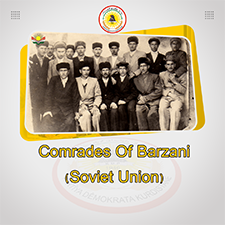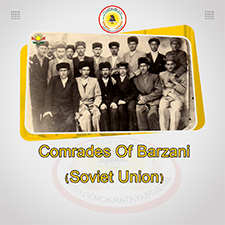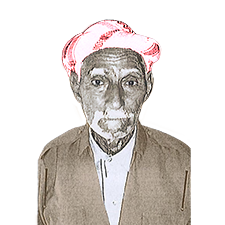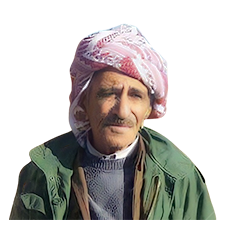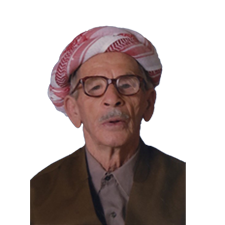Biography
Saleem Shekhomar Ahmad was born in 1888 in Bedud village, Piran sub-district, Mergasur district, Erbil province. He went to the Soviet Union, where he married and had a daughter named Ludmila. He was fluent in Kurdish and Russian. He died in 1954 in Uzbekistan and was buried there.
Service Record
He joined the First Barzan Revolution in 1931. On April 3, 1932, he participated in the Battle of Dulavazhi. On June 21, 1932, he and his family were displaced to Turkey. In 1943, he joined the ranks of the Second Barzan Revolution and participated in the fighting. On August 19, 1945, all his mobile and non-mobile property was confiscated by order of the Iraqi Military Customary Court. On October 11, 1945, after the failure of the Second Barzan Revolution, he moved to East Kurdistan.
On March 31, 1946, he joined the Barzani forces of the Kurdistan Democratic Republic Army. He participated in the battles of Salih Awa, Serwe, and Margawari in East Kurdistan. On 3 May 1946, he participated in the Battle of Malqarani. After the failure of the Kurdistan Democratic Republic on March 25, 1947, he also participated in the battle of Havrs and Halaji. He was one of those Peshmargas who returned to Sherwan and Muzuri on 19 April 1947 through Khwarkurk and Barazgr in North Kurdistan.
After their return, General Mustafa Barzani held a meeting with his comrades in the village of Argosh on 15 May 1947. He gave his comrades a free choice whether they want to stay or go to the Soviet Union. All his comrades decided to continue and leave for the Soviet Union. On May 23, 1947, Saleem accompanied General Mustafa Barzani to the Soviet Union and participated in the Battle of Qtur People and the Battle of Mako Bridge. On June 18, 1947, after plenty of difficulty, he crossed the Aras River on the border between Iran and the Soviet Union.
After arriving in the Soviet Union, on June 19, 1947, he and all his comrades were detained in Nakhchivan, Azerbaijan, for forty days in an open community surrounded by barbed wire and guarded by soldiers. In terms of food, clothing, and transportation, they had been treated as prisoners of war. They were later divided into the regions of Aghdam, Lachin, Ayulakh, and Kalbajar in the Republic of Azerbaijan on the decision of the Soviet government. On December 10, 1947, they were transferred to a military base on the Caspian Sea in Baku, the capital of the Republic of Azerbaijan. On the 23rd of the same month, they were given military uniforms and received eight hours of daily military training under the supervision of officers of the Republic of Azerbaijan. At the same time, they were taught Kurdish for four hours a day by some of their educated comrades.
After Jafar Bakirov's mistreatment of his comrades, Barzani decided to move his military camp from Azerbaijan on August 29, 1948, to the community of Chirchuk near Tashkent, the capital of Uzbekistan, where they continued their military training.
In March 1949, he and his comrades were distributed by train to the villages of the Soviet Union and worked on the farms of the “Kolkhozes” (land that people rented from the government and then gave a share of the product to the government).
After much effort and sending several letters by General Barzani to Stalin, Stalin finally received a letter in which Barzani talked about the suffering of his comrades. He immediately decided to form a committee to investigate the situation of Barzani's comrades. The committee finally decided to gather them all in Vrevsky, so in November 1951, General Barzani and his comrades went to Vrevsky, Soviet Union.
Sources:
-
حیدر فاروق السامرائي، ضیاء جعفر ودوره السیاسي و الاقتصادي في العراق، (لندن – دارالحكمة - 2016م).
-
سهفهر یوسف میرخان، مام خدر مهلا وهسمان: ئهگهر بارزانی نهمر نهبووایه ئێستا هیچ كهسێك له ئێمه به زمانی كوردی قسهمان نهدهكرد، ئۆرگانی پارتی دیموكراتی كوردستان، رۆژنامهی خهبات، ژماره 3456، ههولێر، 27 نیسانی 2010ز.
-
سهبری چاوشین خانۆ، بێدۆد له مێژوودا، (ههولێر – چاپخانهی رۆژههڵات - 2018ز).
-
شهعبان عهلی شهعبان، ههندێك زانیاری سیاسی و مێژوویی، چاپی سێیهم، (ههولێر - چاپخانهی ڕۆژههڵات - 2013ز).
-
عمر فاروقی، سردار دانا زندگی و مبارزات مرحوم ملا مصطفی بارزانی، چاپ دوم، (ههولێر - چاپخانهی وزارت آموزش و پرورش - 2002ز).
-
عهبدولڕهحمان مهلا حهبیب ئهبوبهكر، عهشیرهتی بارزان له نێوان 1931 - 1991، چاپی یهكهم، (ههولێر - چاپخانهی وهزارهتی رۆشنبیری - 2001ز)،.
-
عهبدولڵا غهفور، فهرههنگی جوگرافیای ههولێر، (ههولێر - بڵاوكراوهكانی ئهكادیمیای كوردی - چاپخانهی حاجی هاشم - 2015ز).
-
كاروان محهمهد مهجید، بارزانییهكان له مههابادهوه بۆ سۆڤێت، چاپی یهكهم، (سلێمانی - چاپخانهی پهیوهند - 2011ز).
-
له یادداشتی فهرماندهی شههید حهسۆ میرخان ژاژۆكی، 62 رۆژ لهگهڵ بارزانی دا چوونی بارزانییهكان بۆ یهكێتی سۆڤێت، چاپی یهكهم (ههولێر - چاپخانهی رۆشنبیری - 1997ز).
-
مسعود بارزانی، بارزانی و بزوتنهوهی رزگاریخوازی كورد 1931 - 1958، (دهۆك - چاپخانهی خهبات - 1998ز).
-
نهجهف قولی پسیان، له مهابادی خوێناوییهوه ههتا لێوارهكانی ئاراس، و. شهوكهت شێخ یهزدین، چاپی یهكهم، (پیرمام - یۆبیلی زێڕینی پارتی دیموكراتی كوردستان - 1996ز).
-
ئـ.د.ئـ، فایلی ژماره AI-10، لیستی ههڤاڵانی مستهفا بارزانی بۆ یهكێتی سۆڤێت، بهڵگهنامه لهلایهن سهگڤان هاڵۆ پێشكهش كراوه، 2016ز.
-
ئـ.د.ئـ، فایلی ژماره ZB-192، دهقی چاوپێكهوتن لهگهڵ سهبری چاوشین خانۆ لهلایهن سامی عهبدی، پیرمام، 19 شوباتی 2020ز.




